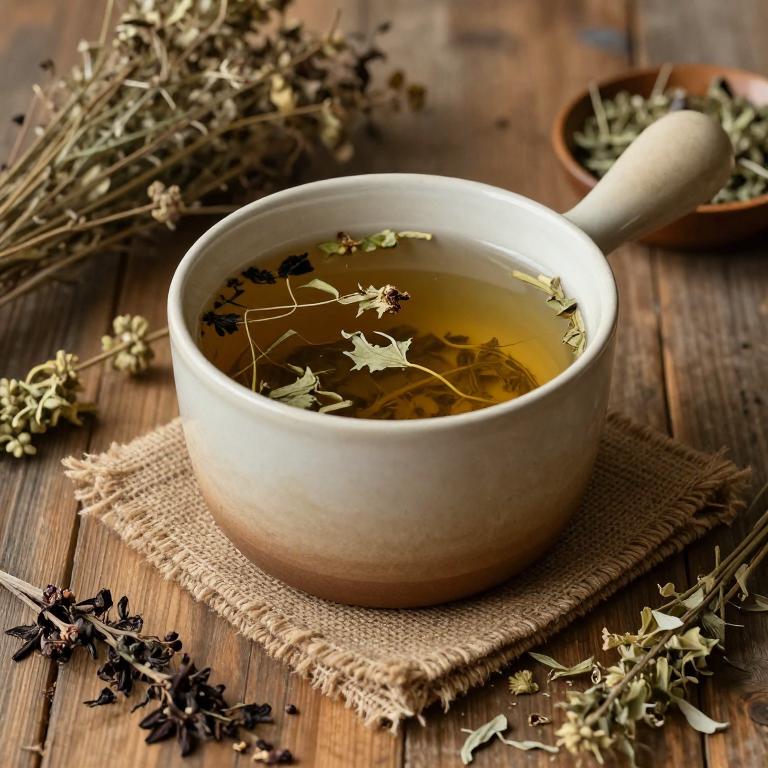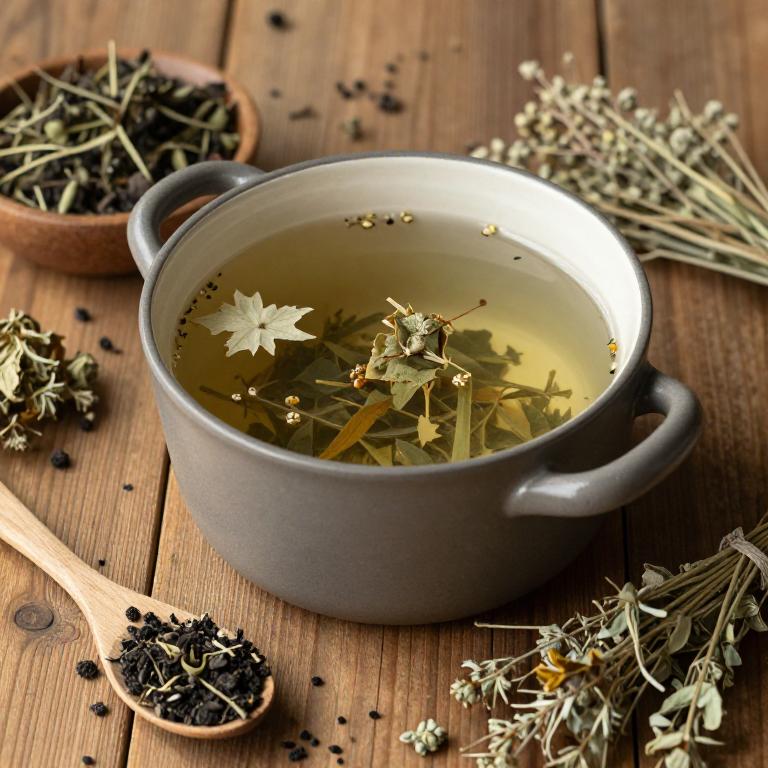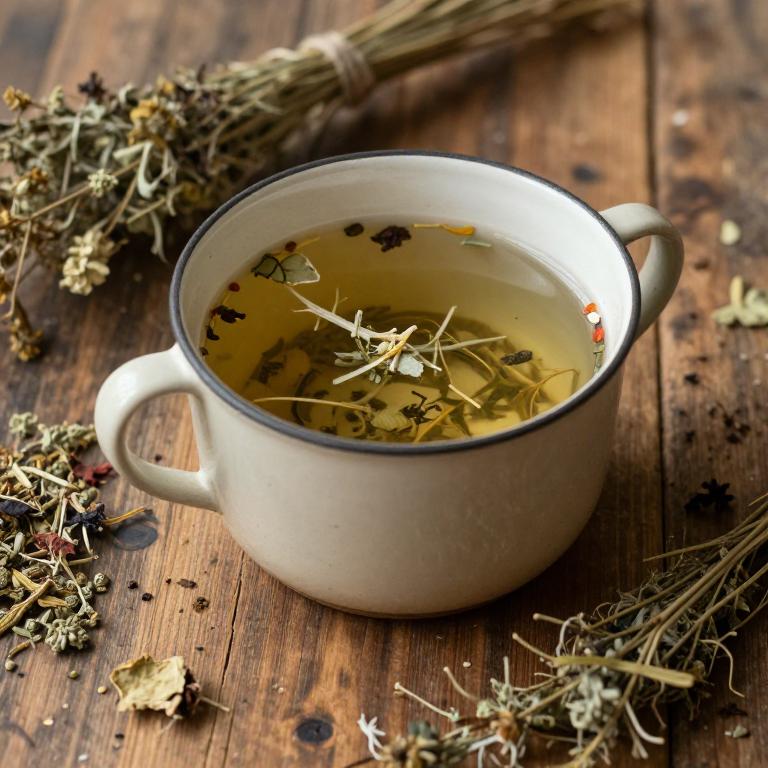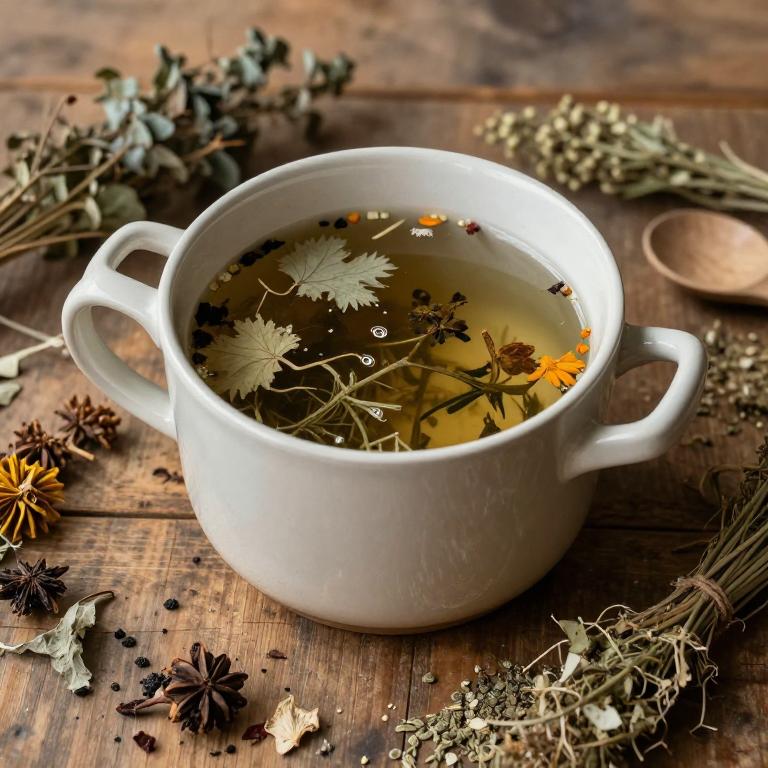10 Best Herbal Decoctions For Angina

Herbal decoctions have been traditionally used to support cardiovascular health and alleviate symptoms of angina, a condition characterized by chest pain due to reduced blood flow to the heart.
Commonly used herbs include hawthorn, garlic, and ginseng, which are believed to improve circulation, lower blood pressure, and enhance heart function. These decoctions are typically prepared by simmering dried herbs in water for an extended period to extract their active compounds. While some studies suggest potential benefits, it is important to consult a healthcare provider before using herbal treatments, as they may interact with medications or have side effects.
Herbal decoctions should not replace conventional medical treatments for angina but may serve as a complementary approach under professional supervision.
Table of Contents
- 1. Salvia (Salvia officinalis)
- 2. Ginkgo (Ginkgo biloba)
- 3. Stinging nettle (Urtica dioica)
- 4. Common grape (Vitis vinifera)
- 5. St. john's wort (Hypericum perforatum)
- 6. White water lily (Nymphaea alba)
- 7. Panax ginseng (Panax ginseng)
- 8. Ceylon cinnamon (Cinnamomum verum)
- 9. Thistle (Silybum marianum)
- 10. Fennel (Foeniculum vulgare)
1. Salvia (Salvia officinalis)

Salvia officinalis, commonly known as sage, has been traditionally used in herbal medicine for its potential cardiovascular benefits, including support for conditions like angina.
Herbal decoctions made from salvia officinalis leaves are prepared by boiling the dried leaves in water, allowing the active compounds to be extracted for consumption. These decoctions may contain compounds such as rosmarinic acid and flavonoids, which are believed to have anti-inflammatory and antioxidant properties that could help improve blood flow and reduce cardiac strain. While some studies suggest that sage may help in managing symptoms of angina, more clinical research is needed to confirm its efficacy and safety for this specific use.
As with any herbal remedy, it is important to consult a healthcare professional before using salvia officinalis decoctions, especially for individuals with pre-existing heart conditions.
2. Ginkgo (Ginkgo biloba)

Ginkgo biloba, a traditional herbal remedy, has been studied for its potential benefits in improving circulation and reducing symptoms of angina.
Its active compounds, such as flavonoids and terpene lactones, are believed to enhance blood flow by dilating blood vessels and reducing oxidative stress. Some research suggests that ginkgo biloba may help increase oxygen supply to the heart, potentially alleviating chest pain associated with angina. However, while preliminary studies show promise, more rigorous clinical trials are needed to confirm its efficacy and safety for this condition.
It is important to consult a healthcare professional before using ginkgo biloba, as it may interact with certain medications, particularly those affecting blood clotting.
3. Stinging nettle (Urtica dioica)

Urtica dioica, commonly known as stinging nettle, has been traditionally used in herbal medicine for its purported cardiovascular benefits.
Some proponents suggest that decoctions made from the roots of Urtica dioica may help in managing angina by improving blood circulation and reducing arterial plaque buildup. These decoctions are typically prepared by boiling the dried roots in water for an extended period to extract their active compounds. However, scientific evidence supporting the efficacy of Urtica dioica for angina is limited, and it is not a substitute for conventional medical treatments.
It is advisable to consult a healthcare professional before using any herbal remedy, especially for conditions like angina, which require careful management.
4. Common grape (Vitis vinifera)

Vitis vinifera, commonly known as the common grape vine, has been traditionally used in herbal medicine for its potential cardiovascular benefits.
Herbal decoctions made from the leaves and seeds of Vitis vinifera are believed to support heart health and may help alleviate symptoms of angina by improving blood flow and reducing oxidative stress. These decoctions contain bioactive compounds such as resveratrol, which have demonstrated anti-inflammatory and antioxidant properties that may contribute to their therapeutic effects. However, while some preliminary studies suggest potential benefits, more rigorous clinical trials are needed to confirm their efficacy and safety for angina treatment.
As with any herbal remedy, it is important to consult a healthcare professional before incorporating Vitis vinifera decoctions into an angina management plan.
5. St. john's wort (Hypericum perforatum)

Hypericum perforatum, commonly known as St. John's Wort, is traditionally used in herbal medicine for its potential cardiovascular benefits.
While it is well-known for its antidepressant properties, some studies suggest that its active compounds, such as hypericin and hyperforin, may have a positive effect on heart health. Herbal decoctions made from Hypericum perforatum are sometimes used to support circulation and reduce inflammation, which may be beneficial for individuals with angina. However, it is important to note that there is limited clinical evidence specifically supporting its use for angina, and it should not replace prescribed medical treatments.
As with any herbal remedy, it is advisable to consult a healthcare professional before using Hypericum perforatum, especially for those with existing heart conditions or taking other medications.
6. White water lily (Nymphaea alba)

Nymphaea alba, commonly known as the white water lily, has been traditionally used in herbal medicine for its potential cardiovascular benefits.
Herbal decoctions made from the rhizomes of Nymphaea alba are believed to support heart health by promoting blood circulation and reducing arterial stiffness. Some studies suggest that compounds in this plant may help lower blood pressure and alleviate symptoms associated with angina by improving coronary blood flow. However, while anecdotal evidence supports its use, more rigorous clinical trials are needed to confirm its efficacy and safety for angina treatment.
It is important to consult with a healthcare professional before using Nymphaea alba as a complementary therapy for cardiac conditions.
7. Panax ginseng (Panax ginseng)

Panax ginseng, a well-known adaptogenic herb, has been traditionally used in East Asian medicine to improve cardiovascular health and alleviate symptoms of angina.
Herbal decoctions made from Panax ginseng roots are believed to enhance myocardial function and improve blood circulation, potentially reducing the frequency and severity of angina attacks. Studies suggest that ginseng may help lower blood pressure and reduce oxidative stress, which are key factors in the development of angina. However, while some research supports its use as a complementary therapy, more clinical trials are needed to establish its efficacy and safety in treating angina.
It is important for patients to consult with healthcare professionals before using Panax ginseng decoctions, as they may interact with certain medications or have side effects in some individuals.
8. Ceylon cinnamon (Cinnamomum verum)

Cinnamomum verum, commonly known as true cinnamon, has been traditionally used in herbal medicine for its potential cardiovascular benefits.
Herbal decoctions made from the bark of Cinnamomum verum may help improve blood circulation and reduce inflammation, which are important factors in managing angina. These decoctions are typically prepared by simmering the bark in water for an extended period to extract its active compounds, such as cinnamaldehyde and essential oils. While some preliminary studies suggest that cinnamon may support heart health, it is important to note that it should not replace prescribed medical treatments for angina.
Always consult with a healthcare professional before incorporating herbal remedies into an angina management plan.
9. Thistle (Silybum marianum)

Silybum marianum, also known as milk thistle, has been traditionally used for its potential cardiovascular benefits, including the management of angina.
Herbal decoctions made from the seeds of Silybum marianum are believed to support heart health due to their antioxidant and anti-inflammatory properties. These decoctions may help improve blood flow and reduce oxidative stress, which are key factors in angina symptoms. However, while some preliminary studies suggest possible benefits, more clinical research is needed to confirm their efficacy and safety for angina treatment.
It is important to consult with a healthcare professional before using milk thistle decoctions as a complementary therapy for angina.
10. Fennel (Foeniculum vulgare)

Foeniculum vulgare, commonly known as fennel, has been traditionally used in herbal medicine for its potential cardiovascular benefits, including support for conditions like angina.
Herbal decoctions made from fennel seeds or leaves are often prepared by simmering the dried parts in water for several minutes to extract their active compounds. These decoctions are believed to help improve circulation and reduce chest pain associated with angina by promoting better blood flow and relaxing blood vessels. However, while some studies suggest that fennel may have mild vasodilatory effects, more research is needed to confirm its efficacy and safety for angina treatment.
It is important to consult a healthcare professional before using fennel decoctions as a complementary therapy for angina, especially since it may interact with other medications or have side effects in certain individuals.